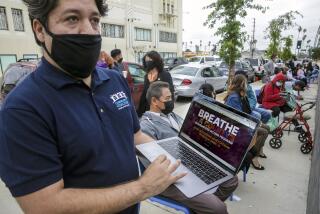Judge Limits County in Requiring Work for Welfare
- Share via
A recipient of general relief welfare funds cannot be required to work off the payments for his disabled spouse under the county’s “workfare” program, a Los Angeles Superior Court judge decided Wednesday.
Under general relief, the county requires that individuals who receive money must work about nine days a month and show they are actively seeking full-time jobs. When a family grant is issued, however, the county has required that either spouse perform the other’s work if that person is unable to do so.
But Judge Irving Shimer, ruling in a civil suit filed by Douglas S. Smith, 24, said he could find no statutory language that would require Smith to work up to 18 days a month in order to collect the $394.50 general relief joint grant for himself and his disabled wife.
The judge stressed that since the suit was filed only on Smith’s behalf, and not as a class action, his decision affected only Smith. Barring a change in policy by the Los Angeles County Department of Public Social Services, recipients in a similar situation will have to file their own suits, or join in a class action, if they wish to try to overturn the county’s requirement.
“He (Smith) has a beef. I have dealt with his beef,” Shimer said, rejecting Legal Aid attorney Donn Ginoza’s request that the order be extended to all married recipients of general relief. “I am not here to reform the whole world.”
Senior Associate County Counsel Amanda F. Susskind, who represented the county and Department of Public Social Services Director Eddy Tanaka, said she did not anticipate that the department would decide on its own to extend the ruling to all affected couples, but would have to discuss the case with officials.
Ginoza, who called the ruling a “bittersweet victory” because it affected only one recipient, said 1,000 of the 14,000 general relief workfare grants issued each month go to couples. But, he added, he was unable to determine how many of those spouses are disabled.
Shimer said he was not opposed to the idea of having spouses assume responsibility for each other’s welfare payments, but found nothing in the law showing that the Legislature and the Board of Supervisors had authorized such responsibility.
“I am not offended at all with the thought that a married welfare recipient can be compelled to provide workfare for what he receives and also for what his wife receives. . . . I applaud this program for many reasons,” Shimer said. “. . . All I am saying is that I am concerned the statutory mechanism is used in a circumstance where I am not satisfied the Legislature intends it to be so used.”
Shimer specifically ordered that Smith be required to work only the number of hours required for the welfare stipend he would be paid as a single recipient--$251.15. That amounts to about nine days a month.
Smith said in his suit that in order to satisfy his wife’s welfare obligations as well as his own, he was required to work nearly full time picking up litter and cutting brush along highways for Caltrans and to contact at least 20 prospective employers each month in an attempt to find a job.
More to Read
Sign up for Essential California
The most important California stories and recommendations in your inbox every morning.
You may occasionally receive promotional content from the Los Angeles Times.










